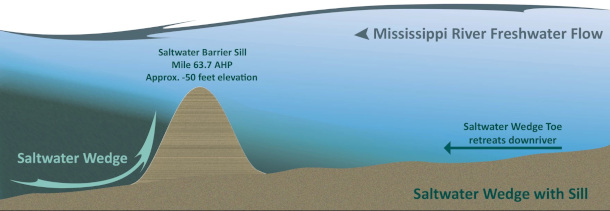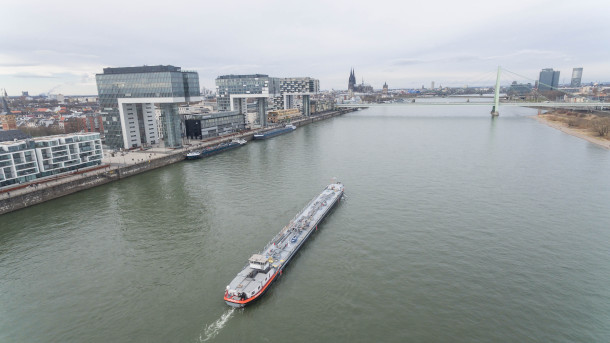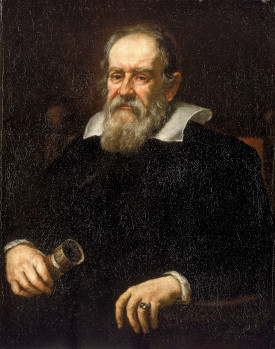Beyond the Headlines
Air Date: Week of February 9, 2024

A graphic depicting what a saltwater wedge looks like, how it interacts with freshwater, as well as the sill, or underwater barrier, constructed by the Corps in July 2023. (Photo: U.S. Army Corps of Engineers)
Living on Earth Contributor Peter Dykstra joins Host Steve Curwood with news of a reprieve -- for now -- for the drinking water supplies threatened by saltwater intrusion in coastal Louisiana. Also, a city in Germany is using the Rhine River as a giant source of heat and cooling potential on an industrial scale. And in history, they mark the birthday and exoneration of the Renaissance’s Galileo Galilei.
Transcript
DOERING: It’s Living on Earth, I’m Jenni Doering.
CURWOOD: And I'm Steve Curwood.
On the line now from Atlanta, Georgia is Peter Dykstra, who takes a look beyond the headlines for us. Hey, Peter, how you been? What's going on down there in Georgia?
DYKSTRA: Well, I've been well, Steve. Topic number one is going to be over in Louisiana, there was a problem with saltwater intrusion threatening drinking water, even in the big cities like New Orleans. Saltwater intrusion happens when there are low levels of freshwater and the saltwater essentially gets into drinking water systems, but that threat is off for now. There was a very, very dry period upstream in the Ohio River, the Mississippi River, and that was threatening for saltwater to come into the drinking water intakes throughout Louisiana. But lately, there's been a very wet, rainy, snowy period and that's postponed the threat.
CURWOOD: So I imagine that Louisiana's guarantee for sweetwater is somewhat limited, and this is a big problem around the world.
DYKSTRA: It's a big problem and a little bit different than the situation in Louisiana, which was caused by temporary drought followed by temporary heavy rainfall. In places like Bangladesh, it's a more permanent and relentless thing. You've got not only higher demand for freshwater, in very marshy, low-lying areas, but the other problem is sea level rise. The oceans and the saltwater levels are getting higher. When those things collide, you could have a food crisis in areas where the freshwater supply is contaminated and you can no longer grow crops.
CURWOOD: Another reason to pay attention to the threat of climate disruption with the rising sea levels.
DYKSTRA: One more.
CURWOOD: One more. Hey, Peter, I understand you have some good news for us about heat pumps. We just talked about a pilot project in Boston in public housing. What's the story you have?

Millions of liters of water flow through the lower Rhine River in Europe daily. Engineers at MVV Umwelt GmbH plan to harness that energy using heat pumps, potentially supplying heat to thousands of homes in the city of Mannheim, Germany. (Photo: Marco Verch. Flickr, CC BY 2.0)
DYKSTRA: We're looking at Germany, particularly the city of Mannheim, along the Rhine River. Heat pumps have been in use throughout Europe in much greater extent than in the US. Germany has about 2 million heat pumps, some drawing heat energy from the air, some drawing heat energy from the ground. Mannheim and other cities are looking at repeating this on an industrial scale by drawing heat out of rivers like the Rhine and using it to heat not only homes but larger businesses, to take the heat, pardon the pun, off of other sources like coal and natural gas.
CURWOOD: And how big a deal is this? I mean, how much heat is there in the river going by there?
DYKSTRA: Well, a project manager named Felix Hack says that in the city of Mannheim, the thermal energy could help heat homes many times over. They are hoping that it can be a real weapon in the fight against climate change.
CURWOOD: Okay, Peter, this is the part of our discussions where you open the history books, you take a look. And I think this week, maybe you have a bit of a telescope to look back?

Galileo Galilei was an Italian mathematician, philosopher and astronomer, who was appointed court mathematician to the Medici dukes of Tuscany at Florence in 1610. (Photo: Royal Museums Greenwich, Wikimedia Commons, Fair Use)
DYKSTRA: A long way back. February 15, 1564. Born in Pisa, Italy, is Galileo, who became a famous astronomer, physicist, and for a while in the Catholic Church, heretic, by moving forward the theory that the Earth revolves around the sun, and not the other way around. The official heresy label came in 1633.
CURWOOD: Eventually, though the Church recanted, if I can use that word.
DYKSTRA: They did. They apologized to Galileo, and it took only 359 more trips around the sun when Pope John Paul the second acknowledged the error and declared ‘my bad’ on behalf of the Church.
CURWOOD: Uh, Peter, wasn't that in Latin?
DYKSTRA: Oh, yeah, mea culpa.
CURWOOD: Thanks, Peter. Peter Dykstra is a contributor from Atlanta, Georgia, and we'll talk to you again real soon.
DYKSTRA: Well, thank you, Steve. Good to talk to you. We'll do it again soon.
CURWOOD: And there's more on these stories on the Living on Earth webpage. That's loe.org.
Links
NOLA | “Saltwater Intrusion Threat to Southeast Louisiana Is Over — at Least for Now.”
Nature and Environment | “Could Large Heat Pumps Revolutionize How We Warm Our Homes?”
Living on Earth wants to hear from you!
Living on Earth
62 Calef Highway, Suite 212
Lee, NH 03861
Telephone: 617-287-4121
E-mail: comments@loe.org
Newsletter [Click here]
Donate to Living on Earth!
Living on Earth is an independent media program and relies entirely on contributions from listeners and institutions supporting public service. Please donate now to preserve an independent environmental voice.
NewsletterLiving on Earth offers a weekly delivery of the show's rundown to your mailbox. Sign up for our newsletter today!
 Sailors For The Sea: Be the change you want to sea.
Sailors For The Sea: Be the change you want to sea.
 The Grantham Foundation for the Protection of the Environment: Committed to protecting and improving the health of the global environment.
The Grantham Foundation for the Protection of the Environment: Committed to protecting and improving the health of the global environment.
 Contribute to Living on Earth and receive, as our gift to you, an archival print of one of Mark Seth Lender's extraordinary wildlife photographs. Follow the link to see Mark's current collection of photographs.
Contribute to Living on Earth and receive, as our gift to you, an archival print of one of Mark Seth Lender's extraordinary wildlife photographs. Follow the link to see Mark's current collection of photographs.
 Buy a signed copy of Mark Seth Lender's book Smeagull the Seagull & support Living on Earth
Buy a signed copy of Mark Seth Lender's book Smeagull the Seagull & support Living on Earth

